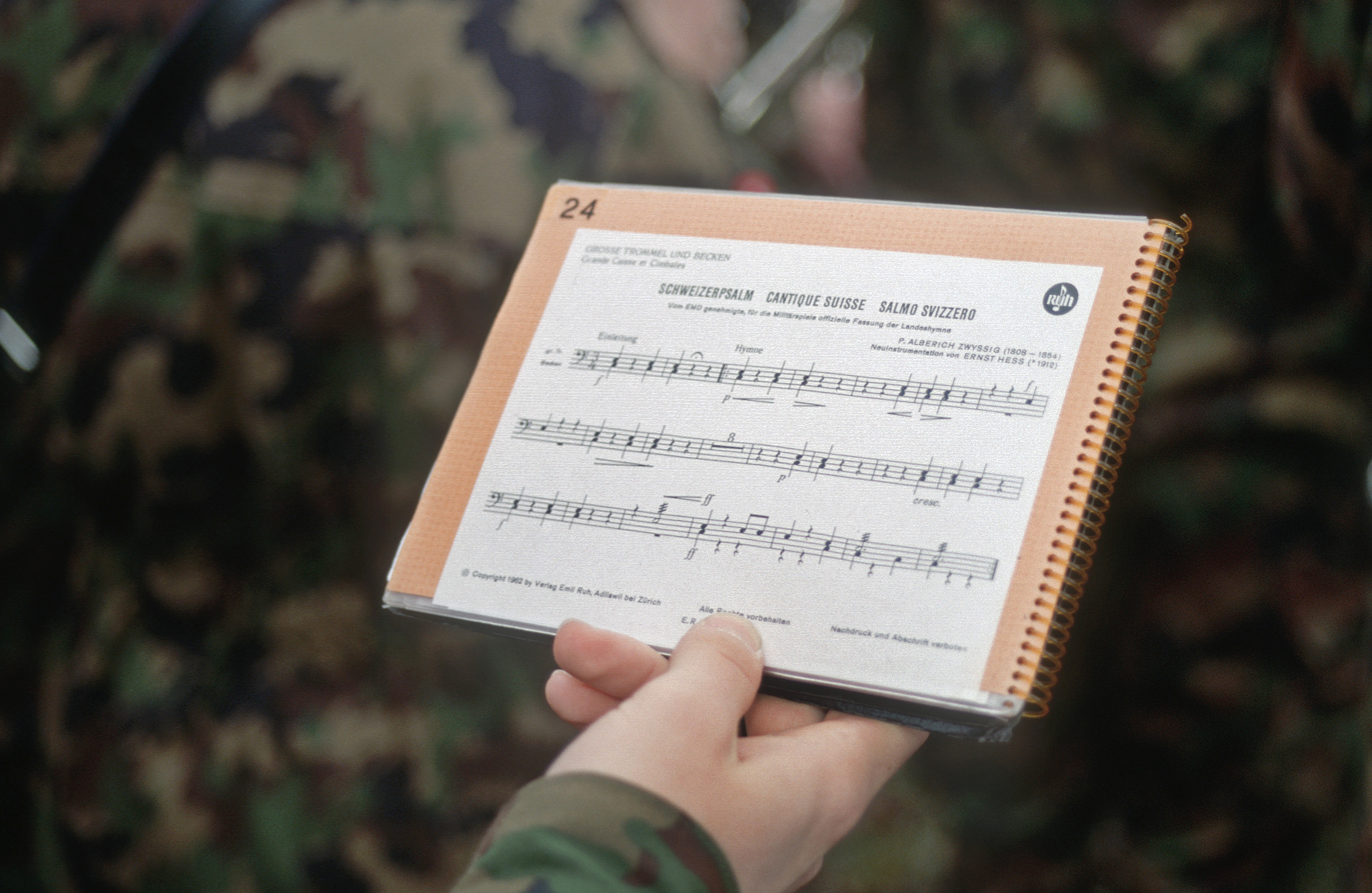Folk called on to fine-tune national anthem

Switzerland has been warming up to the idea of a new national anthem for decades. But replacing – or updating – a piece of Swiss history isn’t easy. The organisers of the latest contest hope to find a song that all Swiss will be proud to sing.
The songs that countries choose to represent them “have really fascinating stories, and some of them really illustrate the politics of countries better than anything else”, says British journalist Alex Marshall, who is writing a book on national anthems. His research has involved a lot of travelling.
“I’ve met everyone from prime ministers to Maoist leaders to football stars to musicians, but I think the most interesting thing is just talking to people on the street, because they’re the ones who sing these songs on a daily basis – or don’t sing them, and think they’re a waste of time,” he says.
Swiss citizens surveyed by swissinfo.ch expressed a range of opinions about their anthem:
“I think it’s old-fashioned. And it’s really hard to understand.”
“It’s beautiful, and I like it!”
“It’s a bit sad compared to hymns from other countries.”
“The national hymn? It’s worthless.”
“It’s okay, but I can’t sing it.”
“I practically fall asleep while I’m singing it.”
Liking the anthem is one thing. Knowing it and being able to sing it is another.

More
A few Swiss sing a few lines
In 2000, a survey in German- and French-speaking Switzerland found that only 3% of Swiss could sing all four verses. Less than a third could sing the first part.
“After the first 30 words you sing ‘la, la, la’,” says Pierre Kohler, describing one reason why the contest – open to the public – is taking place in 2014 to find a replacement which is more in tune with the Switzerland of the 21st century.
Kohler is one of the jury presidents for the group which has launched the initiative, the Zurich-based Swiss Society of Common Good. But the ambivalence the Swiss have towards their national anthem is not new. In fact, the very need for a song of this kind was questioned from the start. And it took the Swiss 140 years to adopt the original German-language hymn, and then only grudgingly.
The text of the “Swiss Psalm” began as a patriotic poem written in German in 1841 by music publisher and lyricist Leonhard Widmer of Zurich. Widmer asked priest and composer Alberik Zwyssig to set the poem to music. Rather than creating a new piece, Zwyssig used a hymn that he had composed for a psalm.
Early on the German hymn was translated rather loosely into the other three national languages – French (Charles Chatelanat), Italian (Camillo Valsangiacomo) and Romansh (Flurin Camathias) – so that it could be sung by choirs throughout Switzerland.
The numerous attempts to have the hymn declared the national anthem were declined between 1894 and 1953. The reason? The Swiss government repeatedly said the decision should be based on popular opinion rather than government decree.
It wasn’t until 1961 – 120 years after its creation – that the psalm was provisionally named the Swiss national anthem. It finally became official on April 1, 1981.
Decades of dissatisfaction
But many Swiss never warmed to the anthem, which an earlier contest organiser likened to a “Swiss weather report”, filled with references to sunsets, stars, and red morning skies.
In 2004, Bern parliamentarian Margret Kiener Nellen submitted a motion asking that a new text be created for the hymn, which she felt was obsolete, prayer-like, and lacking equality between women and men.
Looking ahead to 2008, when Switzerland was to host the European Football Cup, she said: “Imagine the opening of the Euro 2008, and the Swiss Football team standing there with half-closed lips while the national anthem is played.”

More
At a loss for words
Kiener’s motion failed, demonstrating that the original version did have some supporters in parliament. But a motion launched by another MP soon afterward – calling for the hymn to be sung by members of the House of Representatives on the opening day of each of the sessions held four times a year – also failed.
“The anthem is primarily sung on the Swiss national holiday, at sporting events, or on official military and political occasions,” reads the House protocol. There is no tradition of singing the anthem in the Swiss parliament, and “the majority of the office is of the opinion that the singing of the hymn should not be institutionalised.”
One year later, however, another motion – calling for the anthem to be played at the first meeting of each new session – passed, on the condition that MPs were free to decide whether they wanted to sing along.

More
First three lines of the anthem in German, French, Italian and Romansh
Another contest begins
At a celebration of the Swiss national holiday on August 1, the Swiss Society of Common Good announced it would revive the search for a new national anthem.
One of the requirements for the new hymn is that it should reflect the values (such as liberty, democracy, neutrality, “peace in a spirit of solidarity”) found in the Swiss constitution’s relatively new preamble, adopted in 1999. The tune should also bear some resemblance to the current melody. In addition, the song should be singable, “light on the ear” and easy to learn, according to SSCG Director Lukas Niederberger.
The text can be written in any of the four national languages. In fact, it would even be possible to create a text that could be sung in several languages simultaneously.
“We can do that—everyone sings in his own language,” said Oscar Knapp, President of the Romansh public radio and television service, RTR, and coordinator of the Romansh-speaking jury (Knapp is also a member of the committee of the Swiss Broadcasting Corporation, responsible for overseeing swissinfo.ch). This approach is completely normal for Swiss living abroad, he said.
Participants must submit three new verses written in one of the four national languages, including text that reflects the values in the preamble to the Swiss constitution. The melody of the current hymn must be recognisable in the submission. An audio version of the text and melody must be submitted.
Entries will be accepted until June 30, 2014. Submissions will be evaluated by jury members blinded to the identities of the submitters. Jury members representing each of the four national languages will consider the submissions in their own native language, and the best ten submissions overall will be selected and translated into all four languages before a winner is selected. The top ten entires will receive awards ranging from CHF1,000 to CHF 10,000.
Full contest details are available on the organisers’ website in five languages.
International appeal
According to Niederberger, there is a lot of interest in the project from other countries. “They ask us ‘How come an institution of civil society dares to change the national anthem?’”
Foreign countries tend to believe that such a move should be initiated by the minister of culture or the president himself, Niederberger said. But in Switzerland, the people are considered the highest authority.
He described it as a very Swiss, “down-to-earth, bottom-up project”.
It’s also an egalitarian one. You don’t even have to be a Swiss citizen – or live in Switzerland – to enter the contest to create the next anthem.
Standing the test of time
The winning entry will be presented to the Swiss cabinet at some point in 2015 or 2016, but what they do with it will be up to them.
And if a new anthem is in fact adopted, will it succeed in being artistic, literary and timeless?
“We don’t know,” said SSCG President Jean-Daniel Gerber. “We’ll see in ten years whether this text and melody has such a lasting effect. But we will aim for it.”

In compliance with the JTI standards
More: SWI swissinfo.ch certified by the Journalism Trust Initiative

You can find an overview of ongoing debates with our journalists here. Please join us!
If you want to start a conversation about a topic raised in this article or want to report factual errors, email us at english@swissinfo.ch.